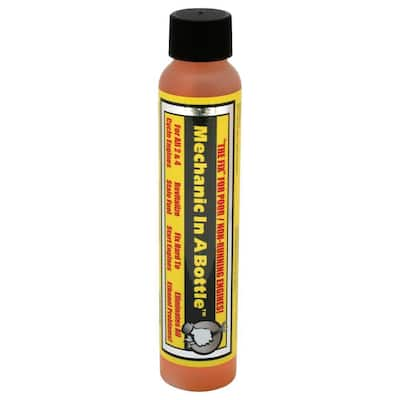
Posted on 05/25/2016 3:54:04 AM PDT by IBD editorial writer
Energy: The EPA’s proposal to increase the amount of ethanol that must be blended into gasoline is a trifecta of regulatory abuse. It will do nothing for the environment, it will do nothing for energy security, and it could wreck millions of car engines
(Excerpt) Read more at investors.com ...
Piston aircraft engines use 100 Low Lead, unless it has been STC’d for auto fuel.
Yes it will ruin engines and all steel it touches.
There is probably an expensive additive that will prevent damage. 535 congress people have probably already bought into the stocks of the company or companies that make the additive based on this insider information that they are allowed to trade on. Getting into government is all about getting rich without any talent or looks or gumption.
Race cars use Methanol alcohol.
note differences @ link:
http://homeguides.sfgate.com/ethanol-vs-methanol-78394.html
I have used both in separate engines and they are not the same thing. Methanol is/can be a wild card.
In street driven cars I prefer no Ethanol and Methanol should be for race cars , Indy, Drags, etc.
The current level of booze in the gas has ruined the carburetors on 2 string trimmers, 1 chain saw, 1 rototiller, 1 brush cutter and a portable pump. Repairs cost me nearly $1,000 a year to get these outfits running in the spring, even though I am religious about draining them each fall or when stored. Vehicles are diesel but the buggers are trying to screw that up too.
Any car designed to run on low octane will run fine on the higher stuff. It’s only if you try to run low-octane fuel in a car that needs high-octane that’s a problem. Octane slows down ignition, making pre-detonation less likely, not more likely.
There is no non-ethanol gasoline available in my state.
Where do you get it?
Not a chance. Elimination is the only way. Revoke the charter. Let the States decide how much protection they can afford.
A gallon of ethanol has 60% of the BTUs of a gallon of gasoline.
A gallon of 10% ethanol blend has 96% of the BTUs of a gallon of gasoline, so you should get about 4% less gas mileage.
Theoretically.
Higher octane fuels are intended to reduce engine knock (pre-ignition or pinging). They do so by adding a “ignition retardant” which makes the fuel less likely to burn spontaneously due to compression. High octane fuels prevent high compression engines from pinging and damaging the engine.
Raising the octane level actually makes the fuel slightly less energetic but allows the advantages of higher compression.
Alcohol dragsters burn methanol. The EPA adds ethanol. Different stuff.
I am running aircraft fuel 100LL with “Motor Doctor”... The lawnmower finally runs. Expensive yes, but cheaper than the 2 quarts for $20 sold @ lawnmower places and at the box stores
IMHO it will hurt off road i.e. farm and lawn equipment the most. This is by design to mess with those that produce, and build that. I think it is a subtle Kass Sunstein “nudge” to get us to go electric / LI-Ion on all those devices, but that is just me.
Ethanol has some energy content (about 2/3 as much as gasoline) so it should be more like 5% more fuel to go the same distance as 100% gasoline.
But I did some more research on this and apparently the situation is complicated:
1. Gasoline is not a pure substance. Is is blended differently in summer and winter and the energy content varies.
2. E10 (10% ethanol) fuels are reported to have more energy than you would expect based on the energy content of ethanol and unleaded gasoline (less than 2% loss in energy vs. computed 3.4%). If accurate, this may also have something to do with blending.
3. Experiments show that gasoline+ethanol mixtures can give better gas mileage than would be expected from their energy content.
4. All anti-knock compounds have lower energy content than gasoline. So premium gas actually has less energy than regular.

“Ethanol will affect rubber hoses and gaskets in older engines. The hysteria about alcohol is way overblown.”
Explain the juxtaposition of those sentences.
Affecting gaskets in my 2006 Explorer seems pretty darned serious, given it otherwise runs well.
Methinks the whole point of the requirement is to affect rubber hoses and gaskets in older engines, as in destroy them (”Cash for Clunkers” writ large, without the compensation and without the voluntary part of destroying the cars). That warrants hysteria.
Disingenuous. They also run a far higher fuel to air ratio when running on alcohol than our ordinary vehicles are capable of PLUS the alcohol they use is primarily methanol if memory serves me correctly.
4. All anti-knock compounds have lower energy content than gasoline. So premium gas actually has less energy than regular.
The alcohol (and its water) acts as an anti-knock agent....the base product for pump gas is 83-octane before they add it. We should plane our heads or get a turbo for higher compression, and get better performance.
Race cars use methanol and ethanol
Disclaimer: Opinions posted on Free Republic are those of the individual posters and do not necessarily represent the opinion of Free Republic or its management. All materials posted herein are protected by copyright law and the exemption for fair use of copyrighted works.